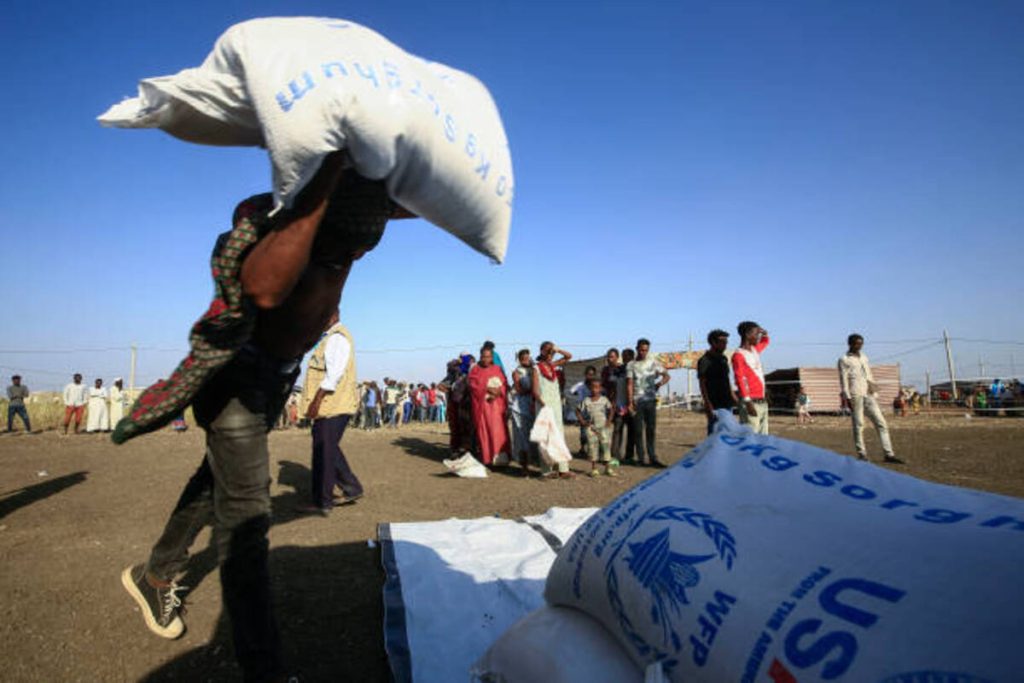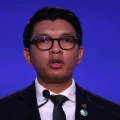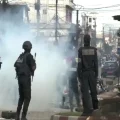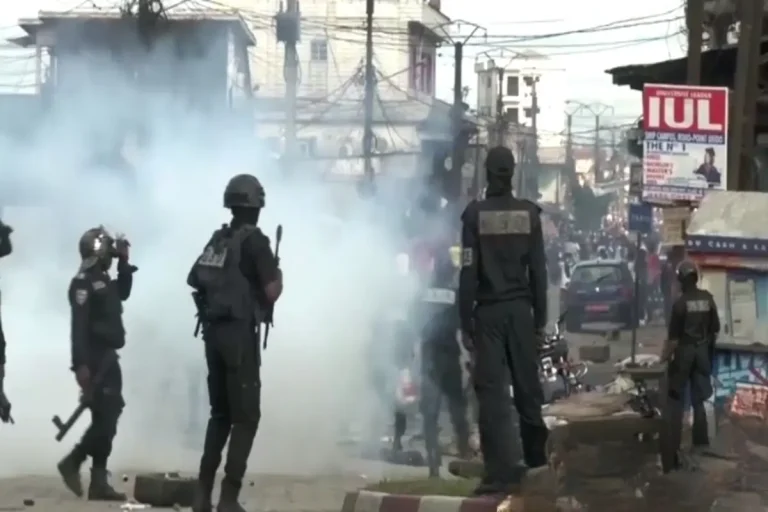
Ethiopian refugees who fled Tigray conflict watch World Food Programme aid unloaded at Village 8 border center in Gedaref, Sudan, November 20, 2020. ASHRAF SHAZLY/AFP via Getty Images.
The World Food Programme confirmed that its Sudan directors were declared “personae non grata” and ordered to leave within seventy-two hours.
No formal explanation was issued by Sudan’s military, which has governed since the civil war erupted in April 2023 between the army and the paramilitary Rapid Support Forces.
The WFP said the expulsions come at a pivotal moment when more than twenty-four million Sudanese face acute food insecurity.
Sudan’s state-run Suna news agency reported that the decision would not affect the country’s cooperation with the WFP.
The WFP said it was engaging with Sudanese authorities to resolve the matter through diplomatic channels.
Sudan’s military escalates confrontation with aid agencies
Humanitarian agencies say the expulsions reflect mounting hostility between Sudan’s military rulers and international relief operations.
The military has previously accused aid groups of violating national laws and exaggerating famine reports to attract foreign pressure.
Diplomats in the region told international media that the expulsion risks undermining relief distribution during one of Africa’s worst hunger crises in decades.
Reuters earlier reported that more than eight million Sudanese have been displaced internally since the war began.
The conflict between Sudan’s military and the RSF has destroyed supply routes, cut telecommunications, and paralyzed banking systems across vast regions.
The United Nations says aid access remains severely restricted, particularly in Darfur and Kordofan, where violence is most intense.
El-Fasher falls as Sudan’s military loses Darfur stronghold
Days before the expulsions, the RSF captured the strategic city of El-Fasher in Darfur after an eighteen-month siege.
The fall of El-Fasher, confirmed by local resistance groups, marked a significant military setback for Sudan’s army.
Residents described widespread looting and indiscriminate shooting during the final assault.
BBC Arabic’s Sudan Lifeline programme quoted an eyewitness saying, “The situation in El-Fasher is extremely dire and there are violations taking place on the roads, including looting and shooting, with no distinction made between young or old.”
The man said he escaped to Tawila, a nearby town where humanitarian organisations are operating despite limited resources.
Tawila, about sixty kilometres west of El-Fasher, already shelters around eight hundred thousand displaced people.
Many of them fled attacks on the vast Zamzam camp in April when the RSF stormed the settlement.
Sudan’s military faces atrocities allegations as famine worsens
Researchers at Yale University said satellite images showed clusters of bodies within the grounds of El-Fasher’s Saudi Hospital.
The El-Fasher Resistance Committee accused the RSF of executing wounded civilians inside the facility.
International organisations, including the African Union and European Union, expressed alarm over the reports of mass killings.
Sudan’s military has not publicly commented on the hospital allegations.
The RSF has denied targeting civilians and said it is securing the city against army counterattacks.
UN officials warn that famine conditions in Darfur resemble the darkest period of the region’s 2003–2020 conflict.
Sudan’s military blamed for blocking aid routes
Humanitarian sources said Sudan’s military continues to restrict convoys attempting to reach besieged areas under RSF control.
According to aid monitors, both warring parties have used starvation as a weapon, violating international humanitarian law.
The WFP said it faces “unprecedented operational challenges” in delivering food to vulnerable populations.
Reuters reported in September that several WFP warehouses in Darfur were looted by armed groups.
The United Nations Office for the Coordination of Humanitarian Affairs said millions of Sudanese are now on the brink of famine due to blocked routes.
Sudan’s military under pressure amid collapsing institutions
Observers say Sudan’s military is struggling to maintain authority across large parts of the country.
The RSF now controls major cities in Darfur, including Nyala, Zalingei and El-Geneina.
Khartoum remains contested, with fighting reported daily in residential districts.
Humanitarian groups warn that the expulsions may deter other agencies from maintaining staff in Sudan.
Diplomatic sources said UN agencies fear broader restrictions could follow if tensions with the military worsen.
The United States, the African Union and the Arab League have all urged Sudan’s generals to allow unhindered aid access.
Sudan’s military criticised for curbing UN engagement
Analysts say the expulsions represent a continuation of the military’s confrontational approach toward the United Nations.
Earlier this year, the army declared the UN’s special envoy Volker Perthes persona non grata after accusing him of bias.
That move prompted several countries to suspend direct engagement with Sudan’s ruling council.
The new expulsions appear to deepen the diplomatic isolation facing Sudan’s military government.
Sudan’s military and the roots of the conflict
The conflict began when long-simmering tensions between the army and the RSF erupted into open warfare in April 2023.
Both factions were once allies who jointly toppled former ruler Omar al-Bashir in 2019.
Power-sharing collapsed after disagreements over the integration of RSF fighters into the regular army.
The violence quickly spread across the country, with Darfur bearing the brunt of the fighting.
The Janjaweed militia, accused of genocide during the 2003–2020 Darfur conflict, evolved into today’s RSF structure.
Human rights organisations have documented widespread abuses by both sides, including killings, sexual violence and looting.
Sudan’s military and humanitarian collapse
UN agencies say the humanitarian crisis in Sudan is now the world’s largest displacement emergency.
More than half the population requires assistance, according to the World Health Organization.
Food shortages have reached catastrophic levels in parts of Darfur, White Nile and Blue Nile states.
Local markets have collapsed as supply chains disintegrate.
The WFP said it has appealed for greater international funding to prevent mass starvation.
BBC Africa reported that food stocks are rotting in warehouses because of blocked roads and insecurity.
Sudan’s military accused of obstructing accountability
Rights groups have urged Sudan’s military leaders to allow independent investigations into alleged atrocities.
The International Criminal Court has already opened inquiries into new war crimes in Darfur.
Human Rights Watch said the military’s expulsion of WFP officials raises concerns over transparency and access for monitors.
Regional mediators say continued obstruction risks prolonging the conflict and worsening famine conditions.
Sudan’s military faces growing international isolation
Western governments condemned the expulsions as a setback to humanitarian diplomacy.
European Union foreign policy chief Josep Borrell said aid operations must be protected under international law.
The African Union urged both Sudan’s military and the RSF to agree to ceasefire negotiations without preconditions.
Related: Four killed in Douala protests over Cameroon presidential election results
Reuters said previous peace talks in Jeddah collapsed after both sides accused each other of violations.
The United Nations Security Council is expected to hold consultations this week on Sudan’s deteriorating situation.





